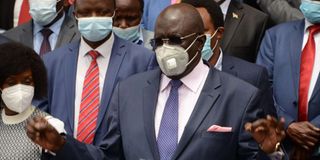Ensure every child gets back to school upon reopening

Education Cabinet Secretary George Magoha addressing journalists at Kenya Institute of Curriculum Development (KICD) on September 21, 2020 on the government's plans to re-open schools.
What you need to know:
- Our concerted efforts in supporting children to return to school is our moral responsibility.
- We are obliged to help them to refocus on learning once again, and increase their resilience to cope with the challenges of life in their childhood and in future.
Kenyans are anxiously looking forward to the reopening of schools. The safety and wellbeing of the children looks relatively brighter than it was in March, when first case of Covid-19 was reported.
The decline in new infections is encouraging and casts a bright possibility for resumption of the socioeconomic life of the country. Children should resume learning in a safe and secure environment.
During the closure, so much has happened to the children that we expect back to school. First, they have been out of active learning for six months. Continuous active learning builds momentum for sustainable improvement in desired learning outcomes. A break not only kills the momentum but is also likely to cause degeneration of learning ability.
Secondly, the incomes of some of the learners’ caregivers will have dwindled as the carnage of Covid-19 deals a devastating blow on the economy and people’s livelihoods.
Others have had to take on an income-generation role to supplement their family’s income. Their return to school may be challenging with a negative implication for learning outcomes.
Additionally, some children will return with psychological and physical bruises from abuse. We have a significant number of girls who have been sexually abused, some of whom got pregnant as a result.
Others will bear trauma from witnessing a level of social decadence they would not have anticipated.
Reopening school will not, ipso facto, lead to resumption of learning, though desirable. The net effect of the unprecedented events is a decline in the motivation and inclination to learn.
Learning requires sustained attention, an unwavering focus and sound mental health. The children’s experiences have certainly unhinged their mental health.
Prolonged closure
For children from poor households, school is a relatively protected space outside the vagaries of rural or urban life, the most reliable one to develop and nurture positive relationships with adults and peers. Prolonged closure denied them a safe haven.
Education stakeholders — parents, teachers, community leaders, policy and opinion leaders — have enormous work on their hands. Besides the reopening, the challenge will be to rekindle learning.
A World Bank report warns that, without major efforts to counter the impact of prolonged school closure, we risk learning loss, increased dropouts, more inequalities and decreased demand for education. They have the potential of reversing the gains in the education sector and may hurt the economy.
Schools and the community must give social and emotional support to the children at home, at school and the space in between; they learn best when adults show care and empathy for them.
Our concerted efforts in supporting children to return to school is our moral responsibility. We are obliged to help them to refocus on learning once again, and increase their resilience to cope with the challenges of life in their childhood and in future.
Education Cabinet Secretary Prof. George Magoha addresses journalists at Kenya Institute of Curriculum Development (KICD) on September 21, 2020 on the government's plans to re-open schools. Dennis Onsongo | Nation Media Group





